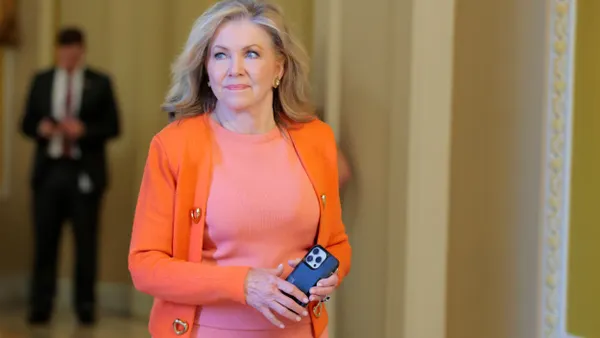Dive Brief:
-
As U.S. businesses plan for a slow emergence from the shutdown, CFOs are coming to terms with a new business environment of lower anticipated revenues and reconfigured workplaces. Companies still face skeptical employees, worried about returning to the workplace safely.
-
In PwC’s fifth COVID-19 CFO Pulse Survey, 55% of CFOs said they are projecting losses in revenue and profits to exceed 10% this year, up only 2 percentage points from two weeks prior, suggesting worries about more severe revenue losses are leveling off. Similarly, job cut expectations held steady, with 31% of CFOs anticipating layoffs in the next month.
-
Additionally, the survey shows CFOs' urgency to reduce expenditures and cut costs are diminishing. Eighty percent of CFOs are considering cost containment measures, down from 86% two weeks ago. In addition, fewer CFOs are anticipating furloughs over the next month (36% vs. 44% two weeks ago).
Dive Insight:
One area of prime CFO confidence exists — the ability to protect their workers. Nearly two-thirds (64%) said they're "very confident" their company can help create a safe workplace environment for employees.
In addition, 83% anticipate changing workplace safety measures, up 6% from two weeks prior, and 43% anticipate making remote work a permanent solution for roles that can accommodate it.
Employers will likely still face multiple employee concerns about returning to the workplace. In a separate survey of only employees, 51% told PwC the fear of getting COVID-19 would prevent them from going back to the workplace if their employer asked. In addition, nearly a quarter (24%) are unwilling to use public transportation for their commute, and 21% cite their responsibility as a parent or caregiver as preventing them from returning to work.
"Given the unprecedented nature of this global pandemic, workers are clearly very worried," Tim Ryan, PwC's US Chair and Senior Partner, said. "The most important thing business leaders can do to address their employees' worries is to communicate frequently and transparently about how they are working behind the scenes to keep them safe, healthy and employed."
"As more companies reopen, CFOs are coming to terms with a new reality, and managing their expectations accordingly," PwC Chief Clients Officer Amity Millhiser said. "We're seeing many leaders begin to pull back from drastic cost containment measures as they figure out how to operationalize their businesses in a new environment."
But, Millhiser notes, this could all change if there is a future spike in infections. CFOs don't have much of a contingency plan for that. For the first time, 58% of CFOs said they expected at least three months before their company would return to "business as usual," if the virus were to end today.
On the upside, 72% of CFOs believe their companies will be more agile and resilient going forward, and 68% said the move to a flexible work environment has better-equipped their companies for the long run.
"This is our fifth time running this survey, and the one area we continue to see CFO sentiment worsening is the time they think it'll take to return to normal," Millhiser told CFO Dive. "The situation is so fluid, though. That’s why we’re running it every two weeks."
Employers themselves, in the absence of widespread testing or a vaccine, will implement as many preventative measures in their workplaces as they can, Millhiser said.
Millhiser encourages CFOs to enable a work from home virtual culture in the finance function. "We're hearing from CFOs that there are many opportunities to leverage employees, and back office tech to really let their teams work from home."
To bridge the confidence gap between employer and employee, Millhiser cautions CFOs to "really pay attention to communication," both the cadence and the tone. "It’s a really important time to reinforce your corporate culture, but also establish and create trust between employees and employers," she said. "They’re looking to you for information. Maintaining frequent, transparent communication is critical, and that's not unique to the CFO."
Bottom line: companies have mostly normalized the crisis. What that really means, according to Millhiser, is that they’re coming to terms with the significant impact the crisis will have on their earnings, revenue, and liquidity, and they're adapting their operations to the new normal.
Additionally, COVID-19 has accelerated digital transformation and made it more urgent for company success.
"For CFOs, I think this is a great opportunity for them to take the lead," Millhiser said. "The agility to pivot quickly is a real asset. It was happening before, but now it’s coming up at a much faster pace."














